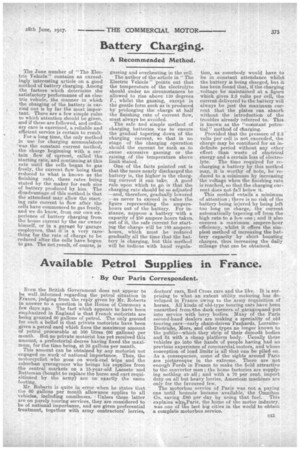Available Petrol Supplies in France.
Page 11

If you've noticed an error in this article please click here to report it so we can fix it.
By Our Paris Correspondent.
Even the British Government does not appear to be well informed regarding the petrol situation in France, judging from the reply given by Mr. Roberts in answer to a question in the House of Commons a few days ago. The fact which appears to have been emphasized in England is that French motorists are being granted 60 gallons of petrol. The only ground for such a belief is that private motorists have been given a petrol card which fixes the maximum amount of petrol procurable at 300 litres (66 gallons) per month. But no private motorist has yet received this amount, a prefectorial decree having fixed the maximum, for the time being, at 35 gallons per month.
This amount can be obtained by any motorist not engaged on work of national importance. Thus, the motorcyclist who goes on week-end trips and the suburban greengrocer who brings his supplies from the central markets on a 15-year-old Lacoste and 13atteman (bought to replace the horse and cart requisitioned by the army) are on exactly the same footing.
Mr. Roberts is quite in error when he states that the 60 gallons per month allowance applies to all vehicles, includmg omnibuses. Unless these latter are on purely touring services, they are considered to be of national importance, and are given preferential treatment, together with army contractors' lorries, doctors' cars, Red Cross cars and the like. It is surprising to what an extent utility motoring has developed in France owing to the army requisition of horses. All kinds of old-type touring cars have been unearthed from .the dark cornersof_garagespand put into service with lorry bodies. Many of the Paris second-hand dealers are making a speciality of old touring cars—early chain-driven Panhards, LorraineDietrichs, Mors, and other types no longer known to the public—which they 'strip of their demod6 bodies and fit with a cheap platform body. Usually these vehicles go into the hands of -people having had no previous experience of commerciaL motors, and whose conception of load limits' is all that can be piled on. As a consequence, some of the sights around Paris are picturesque in the extreme. There are not enough Fords in France to make the field attractive to the converter men ; the hems factories are supplying nothing at. all; and with a 70 per cent. import duty on all but heavy lorries, American machines are only for the favoured few.
The motorbus service of Paris wan not a paying one until benzole became available, the Omnibus Co. saving 260 per day by using that fuel. This explains whyt,Paris, the home of the motor industry, was one of the last big cities in the world to obtain a complete motorbus service.




















